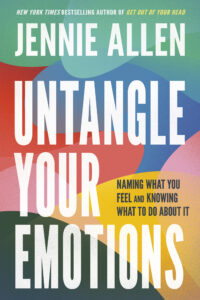Have you ever sat down with someone for coffee or lunch and that person started sharing what was really going on in their life, maybe even getting teary about it?
How do you feel in that moment? Sure, there might be a moment or two of awkwardness, but beneath the uncertainty of what to say or do, what is it that you feel?
I bet you feel compassion.
Affection.
Grateful, even, that they shared their life with you.
You feel connected to them, even if you don’t know them all that well. That’s what emotions are meant to do: connect us to what is most important. And to who is most important.
Our emotions have a purpose, and that purpose is to connect us to God and one another.
Everything that God has placed inside us is for the purpose of drawing us near to Him, to trust Him. Take away the childlike fear and we lose our childlike inclination to pull close and ask Him for help. Take away excitement at an incredible meal and we lose our awe and wonder at the gifts of God. Take away hope and we never look to heaven. Take away peace and we never rest in God.
The truth that sets us free begins with the truth that we are sad or hurting and desperately and urgently need help. There is no hope for health, joy, peace, and salvation apart from Jesus, the One who is all and has done all for us. He died on the cross for our sins. He was raised to new life again. He offers us grace and forgiveness and an eternity spent with Him.
That’s it.
That’s the gospel.
The Bible is clear that the truth of that sets us free:
Jesus said to the Jews who had believed him, “If you abide in my word, you are truly my disciples, and you will know the truth, and the truth will set you free…. So if the Son sets you free, you will be free indeed.” (John 8:31-32)
Certainly, Jesus is speaking of Himself in this verse: the truth of who He is as the means and the way of salvation. The ultimate freedom we need is to be freed from the eternal consequences of our sin. And right now, that is available to you if you trust Jesus as the only means for salvation.
But it doesn’t stop there. The Bible is filled with stories of people who worked out that hope and truth and freedom with their emotions, with how they felt.
Paul hated Christians, was murdering them, until Christ met him and rescued him. That extreme emotion turned to impassioned grace and fervor to reach the world with the hope of Jesus. (1 Corinthians 2:9-11)
King David poured out his guts throughout the book of Psalms. The songs of lament are the most emotive, raw, messy parts of the Bible. He’s mad at God. He’s sad with God. He has given up and lost all hope, and then, in his honesty with God and himself and others who are listening, he comes back to all that he knows to be good and true of God.
The beauty of David and the Psalms is the permission to feel it all. David had full confidence that God could handle all his emotions, even the ones that caused him to doubt that God is good and that God still loves him. He sees injustice go unpunished and he’s ticked!
He feels safe enough with God to wrestle it all out! Do you?
THE TRUTH? It is freeing. It’s freeing when we tell the truth! But we can’t get that done without admitting how we feel, without confessing what our lived experience is.
We can confess sin.
We can share our pain.
We can confide our fears.
We can cry through gut-wrenching grief.
We get to express what we’re thinking as long as we express what we’re feeling too. Tell God and trusted loved ones all these things so that you can finally live fully free, connected to one another by the rope of emotion.
If, as you’re reading these words, you’re feeling paralyzed by sadness, anger, grief, or disappointment, I want you to know something: Given everything we are presented with in this lovely world of ours, its amazing to me that you don’t feel more than what you’re feeling right now. That’s the first thing I would say, were we seated across from each other, face-to-face.
We know that emotions are all-encompassing. They make you ecstatic when you see your kids succeed on their own and take their first steps. They make you feel sick to your stomach when you’re nervous and scared. They make you feel your chest get tight when you’re reminded that the future is beyond your control. They make you anxious when you fall in love and aren’t sure the other person feels the same way. They make you cry when you see pain and suffering and can’t fix it in your life or in the world.
Something about emotions is connected to our thoughts, but equally true is that they’re also different somehow.
Maybe you feel like you are staring at an ocean of emotions, wondering how you could ever get across. It’s too big. All the hope and grief, joy and anxiety, unshakable memories both good and painful. How on earth do you cross? And then closing in behind you is life, the constant reality of the people needing to eat, the assignments that are due, the places you need to be.
How am I supposed to deal with this ocean?
Do I even want to do this right now?
I’m here to remind you that you are not standing on that shore alone. The same God who accompanied the Israelites as they stared at the water in front of them, knowing the Egyptians were closing in from behind, and the same God who split the sea— He split the sea! —that God is near. He’s right there beside you. He can do a miracle here.

Adapted from Untangle Your Emotions: Naming What You Feel and Knowing What to Do About It. Copyright © 2024 by Jennie Allen. Published by WaterBrook, an imprint of Penguin Random House, LLC.
Article Topics
Scripture References
- John 8:31-32
- 1 Corinthians 2:9-11
Keep Browsing








